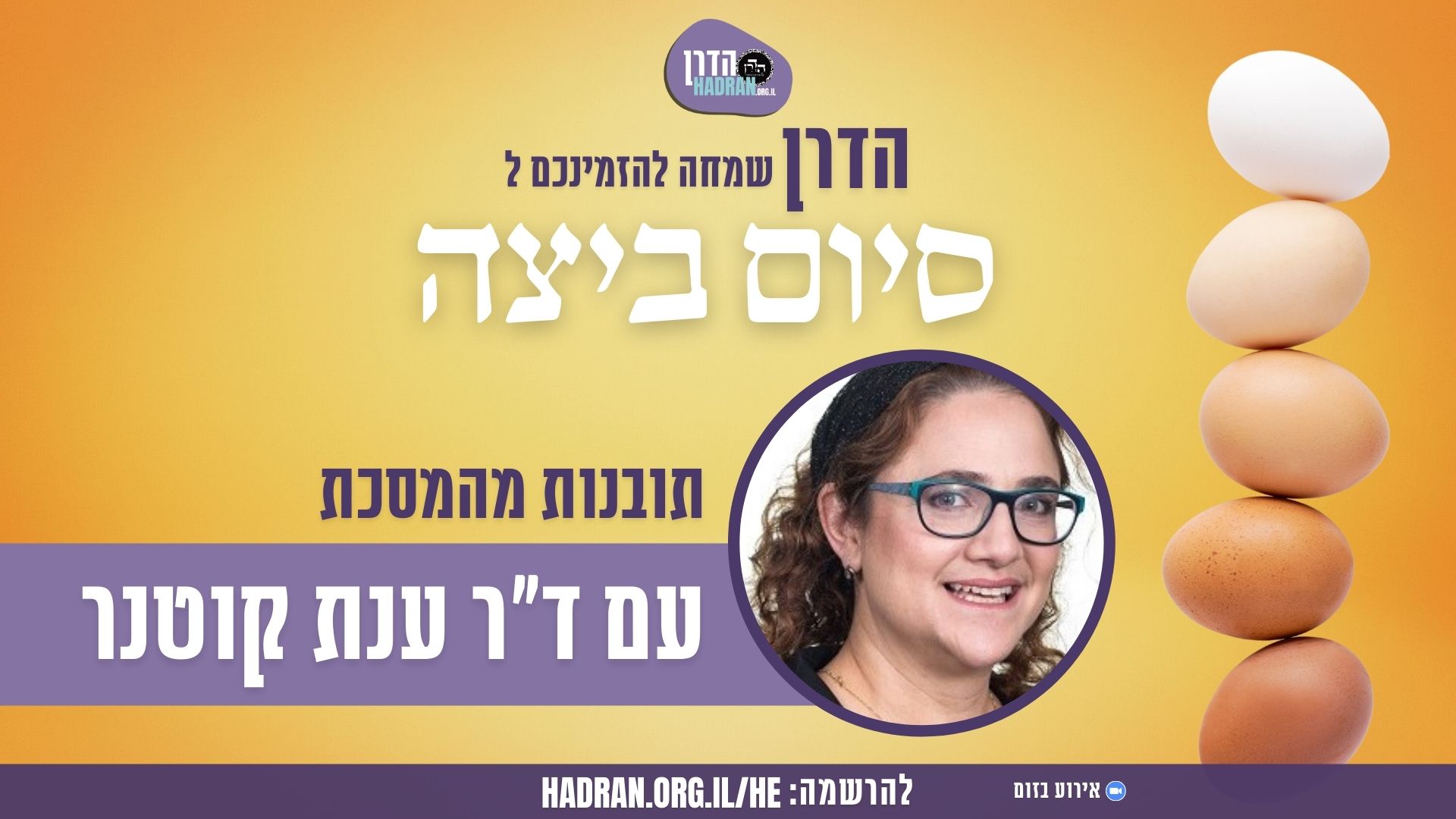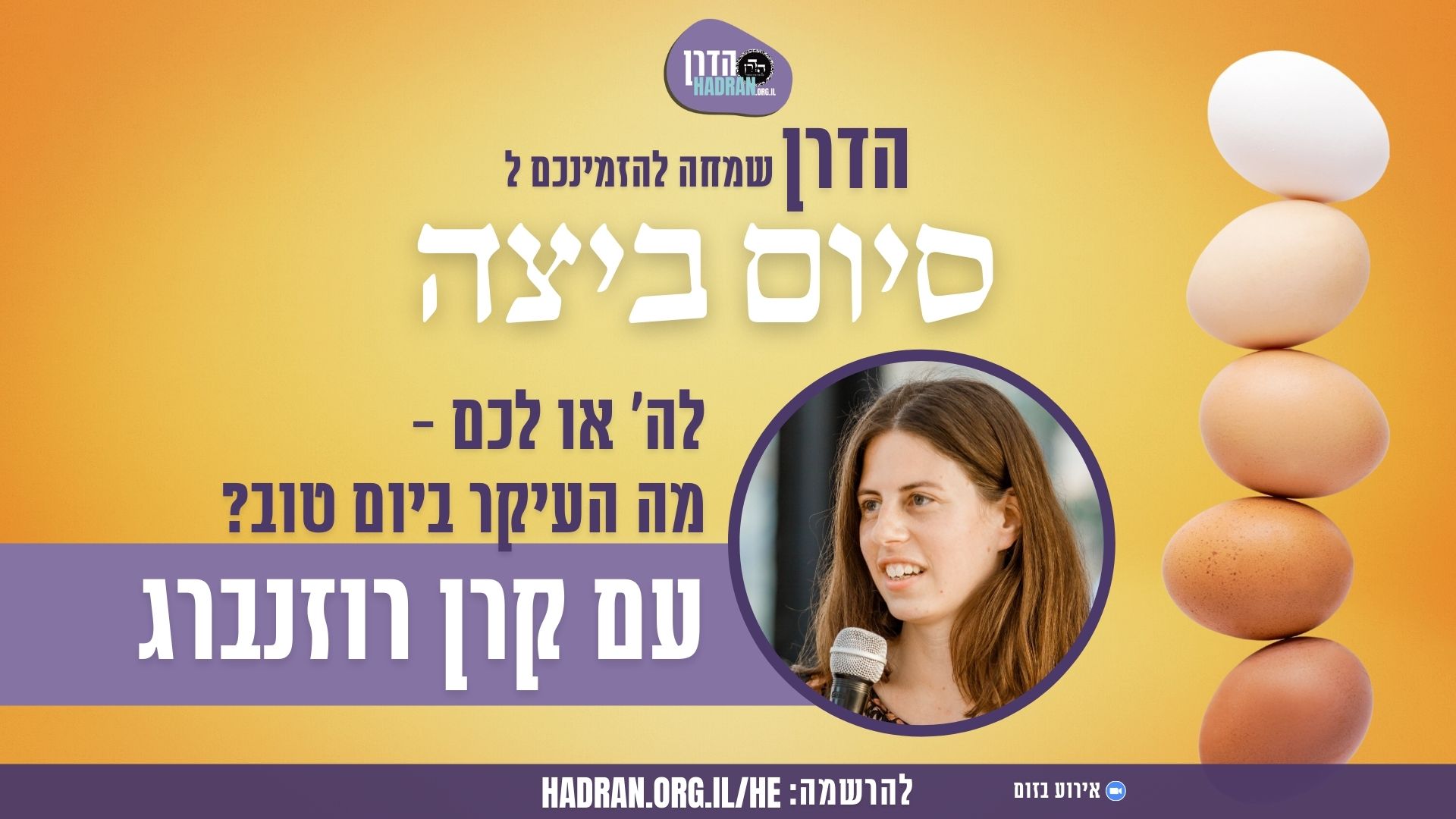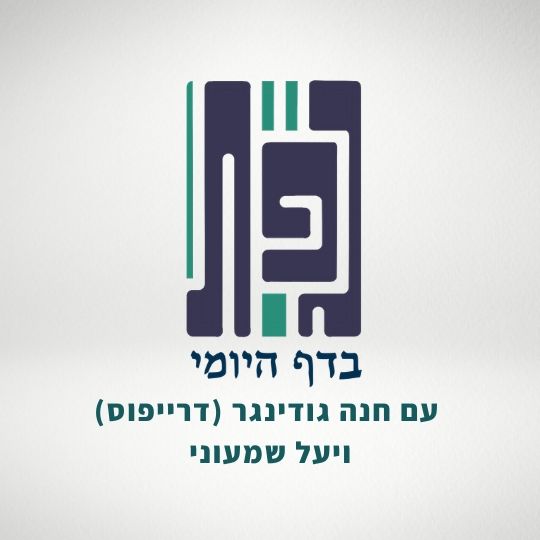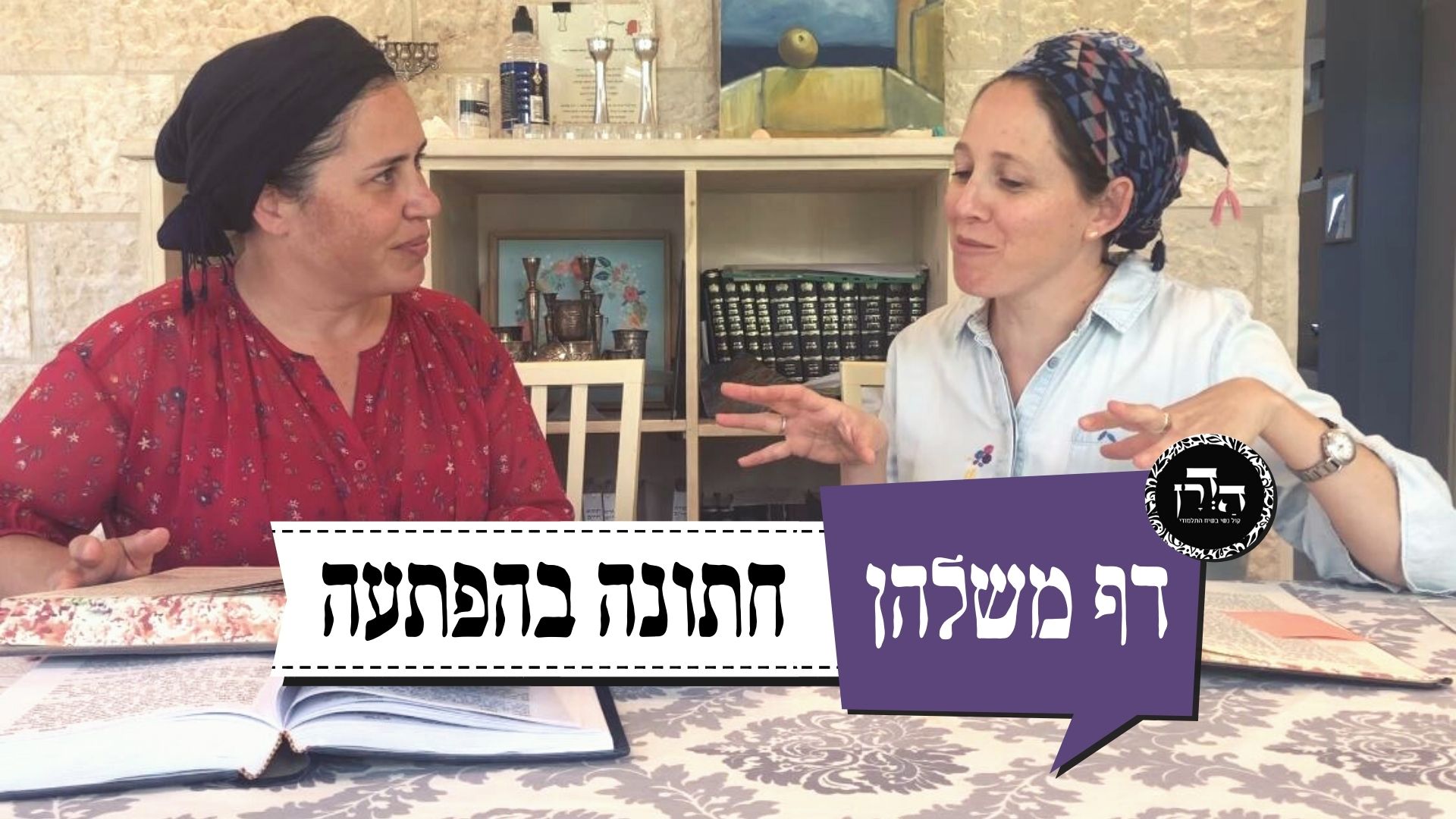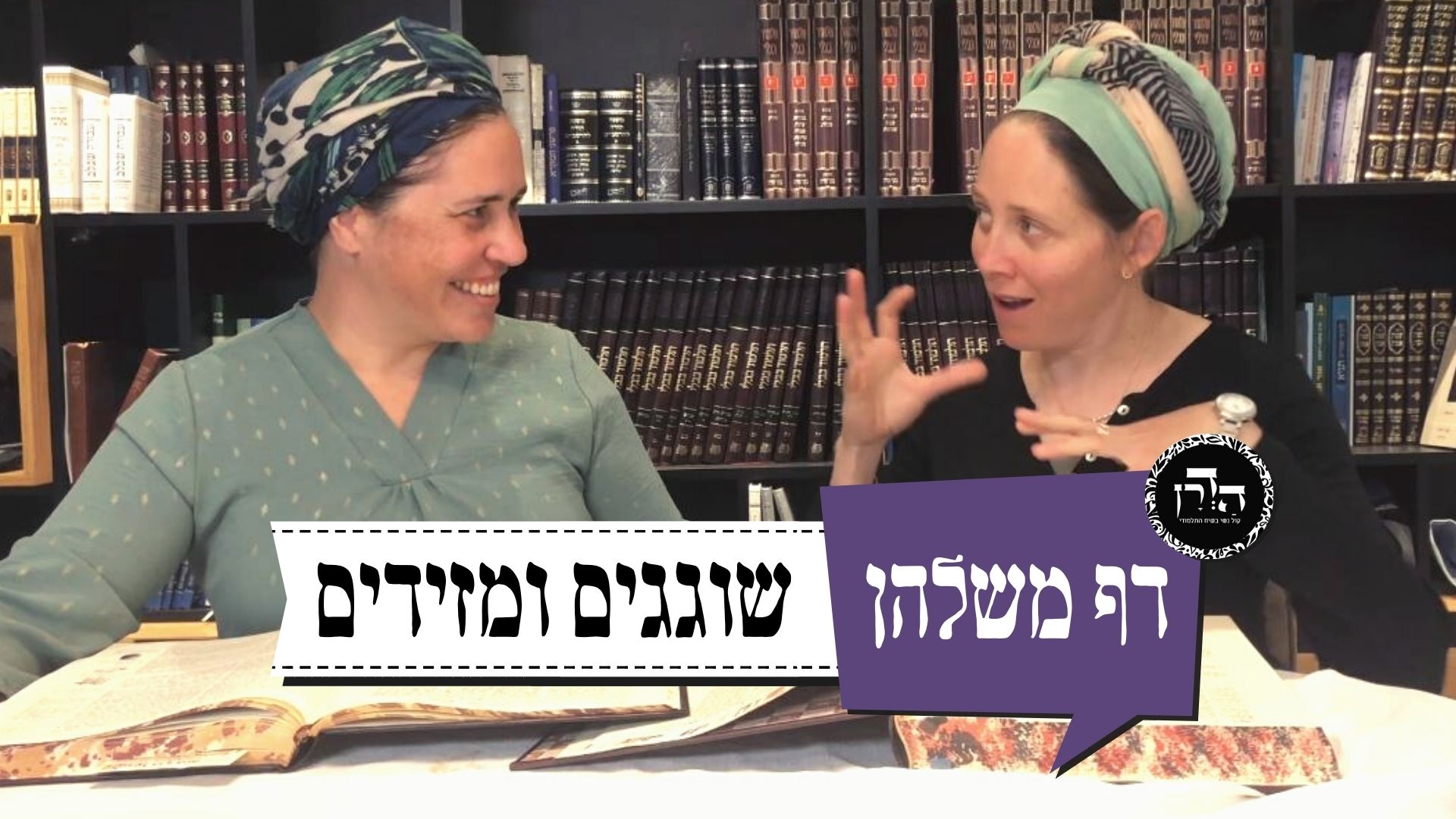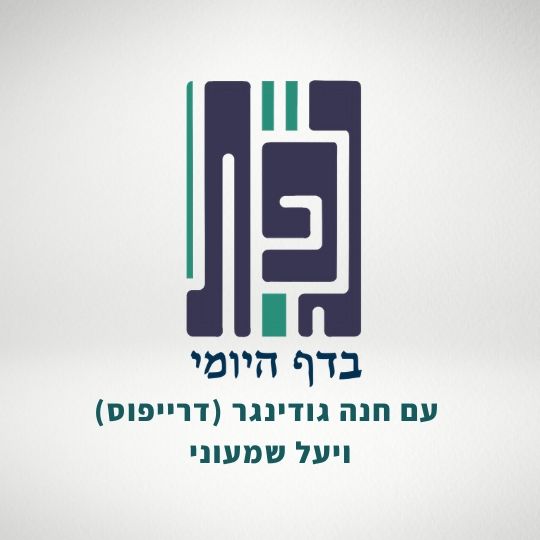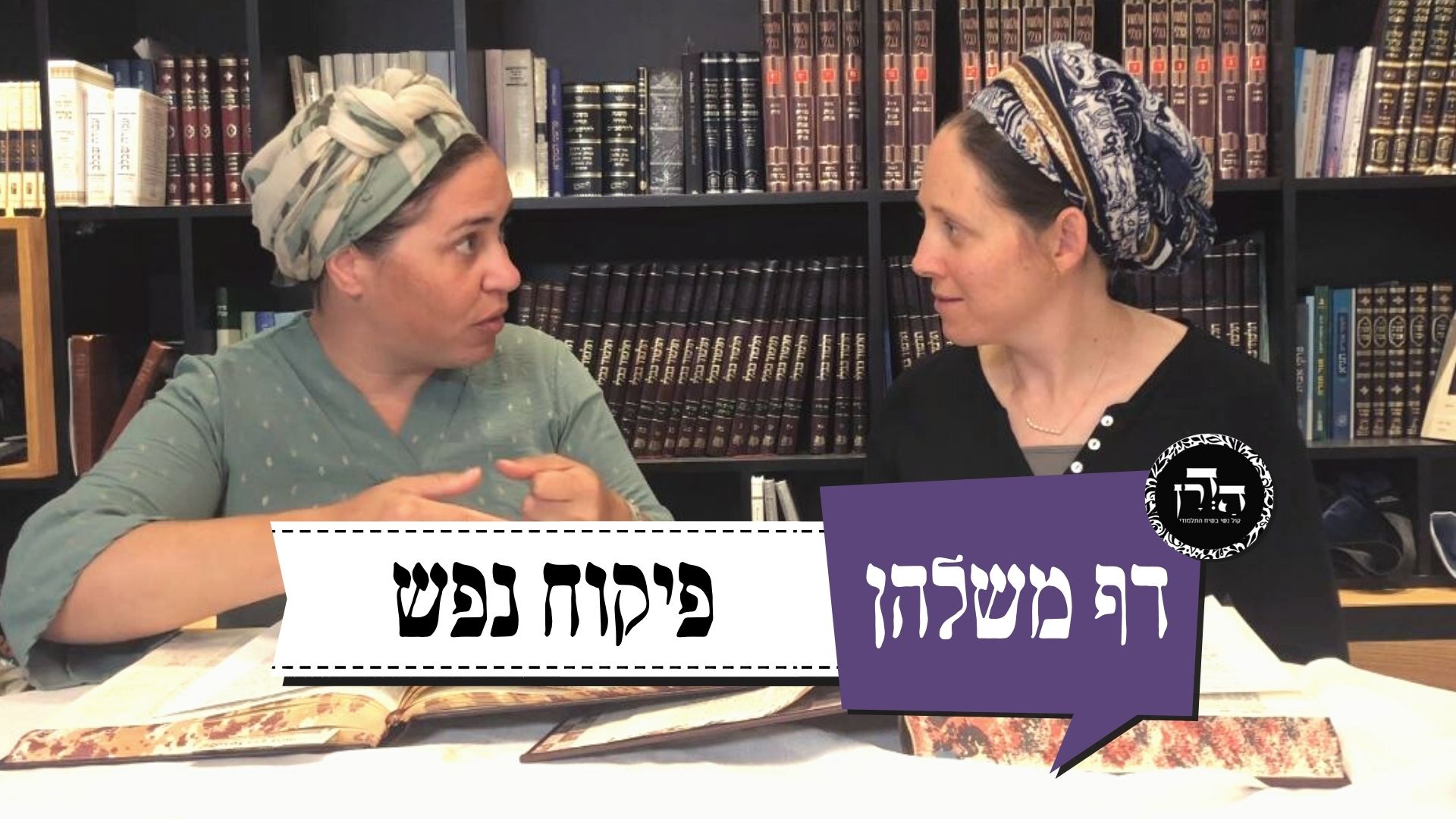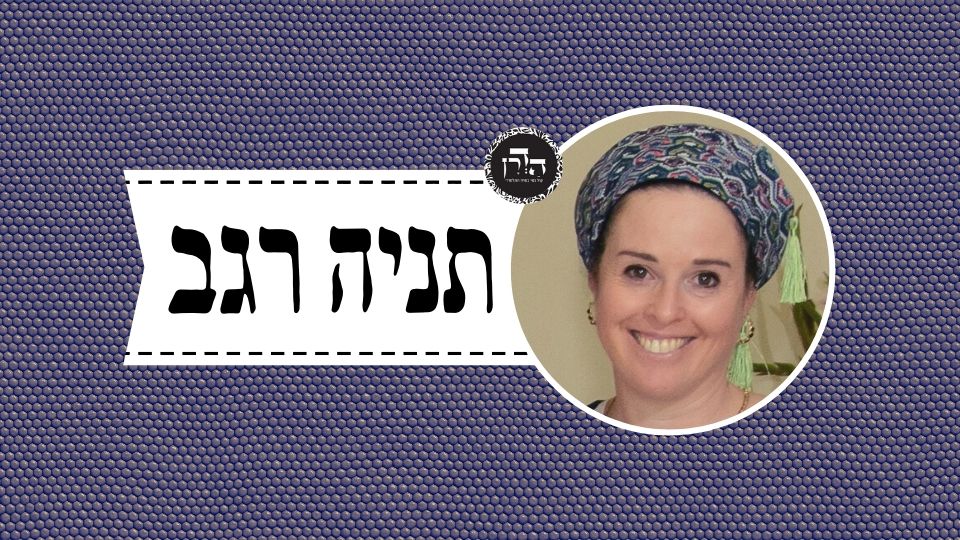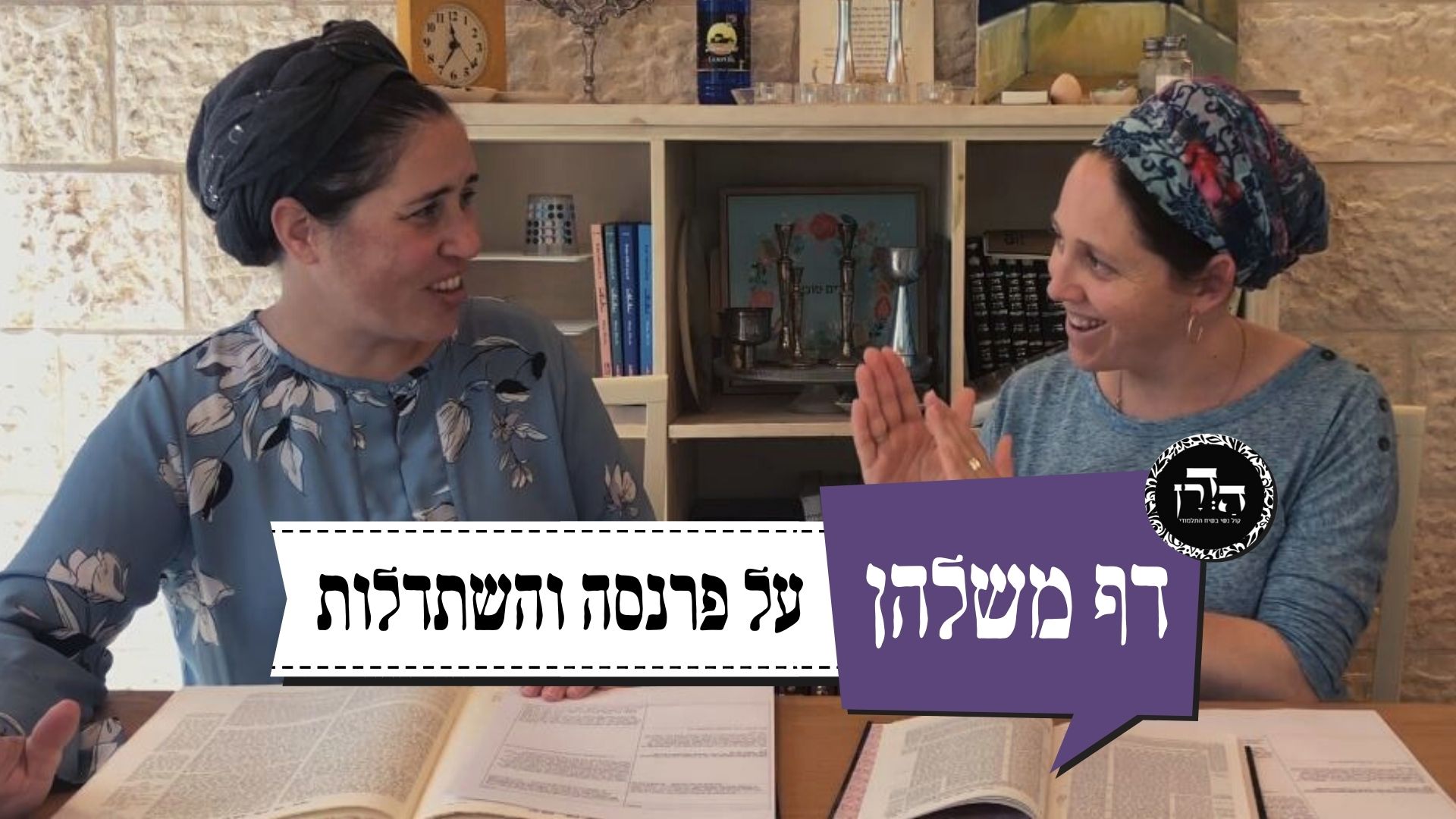ביצה לג
וְכֵן בֵּיעֲתָא, וְכֵן קְדֵרָה, וְכֵן פּוּרְיָא, וְכֵן חָבִיתָא.
And similarly, if one wishes to place eggs on the mouth of a hollow vessel or on a grill sitting above coals, he must first hold the vessel in his hands and put the eggs on it, and only afterward position them both on the coals. And similarly, with regard to a pot placed on barrels, one must hold the pot above the barrels before placing them underneath it. And similarly, in the case of a collapsible bed, whose legs and cover are separate pieces, one must first stretch the upper part, then add the legs. And similarly, in the case of barrels positioned one on top of the other, the upper one must be held in place first and then the others added below.
וְאֵין סוֹמְכִין אֶת הַקְּדֵרָה בַּבְּקַעַת, וְכֵן בַּדֶּלֶת. בַּדֶּלֶת סָלְקָא דַּעְתָּךְ?! אֶלָּא אֵימָא: וְכֵן הַדֶּלֶת. תָּנוּ רַבָּנַן: אֵין סוֹמְכִין אֶת הַקְּדֵרָה בַּבְּקַעַת, וְכֵן הַדֶּלֶת, לְפִי שֶׁלֹּא נִתְּנוּ עֵצִים אֶלָּא לְהַסָּקָה. וְרַבִּי שִׁמְעוֹן מַתִּיר.
§ It was taught in the mishna: And one may not prop a pot with a piece of wood, and similarly a door. The Gemara asks: With regard to a door, can this enter your mind? Is it possible to prop a pot by means of a door? Rather, say and correct the wording as follows: And similarly, one may not prop a door with a piece of wood. The Sages taught: One may not prop a pot with a piece of wood, and similarly a door, as wood is to be used only for kindling. With regard to any use other than kindling, wood is considered muktze. And Rabbi Shimon, who does not accept the prohibition of muktze, permits it.
וְאֵין מַנְהִיגִין אֶת הַבְּהֵמָה בַּמַּקֵּל בְּיוֹם טוֹב, וְרַבִּי אֶלְעָזָר בְּרַבִּי שִׁמְעוֹן מַתִּיר. לֵימָא רַבִּי אֶלְעָזָר בְּרַבִּי שִׁמְעוֹן כַּאֲבוּהּ סְבִירָא לֵיהּ, דְּלֵית לֵיהּ מוּקְצֶה? לָא, בְּהָא אֲפִילּוּ רַבִּי שִׁמְעוֹן מוֹדֶה, מִשּׁוּם דְּמִחֲזֵי כְּמַאן דְּאָזֵיל לְחִנְגָּא.
The baraita continues: And one may not lead an animal with a stick on a Festival, but Rabbi Elazar, son of Rabbi Shimon, permits it. The Gemara asks: Shall we say that Rabbi Elazar, son of Rabbi Shimon, holds in accordance with the opinion of his father, Rabbi Shimon, who is not of the opinion that there is a prohibition of muktze, and he therefore permits one to take any stick and lead an animal with it? The Gemara rejects this: No, there is no issue of muktze here at all, for in this case even Rabbi Shimon concedes to the first tanna that this activity is prohibited, not due to muktze but because one who does so looks like one who is going to the market [ḥinga] in the manner of a weekday. On a Festival, one must therefore lead the animal in an unusual fashion.
חִזְרָא, רַב נַחְמָן אָסַר, וְרַב שֵׁשֶׁת שָׁרֵי. בְּרַטִּיבָא — כּוּלֵּי עָלְמָא לָא פְּלִיגִי דְּאָסוּר. כִּי פְּלִיגִי — בְּיַבִּשְׁתָּא. מַאן דְּאָסַר, אָמַר לָךְ: לֹא נִתְּנוּ עֵצִים אֶלָּא לְהַסָּקָה. וּמַאן דְּשָׁרֵי, אָמַר לָךְ: מָה לִי לִצְלוֹת בּוֹ, מָה לִי לִצְלוֹת בְּגַחַלְתּוֹ?
§ In a case where one takes a bamboo branch to use as a skewer, Rav Naḥman prohibits it because it is muktze, since it was not made into a vessel the day before, and Rav Sheshet permits it. The Gemara elaborates: In the case of a wet branch, everyone agrees that it is prohibited; it is unfit for kindling and is therefore muktze. When they disagree, it is in the case of a dry branch. The one who prohibits handling it, Rav Naḥman, could have said to you: Wood is only for kindling, but it is considered muktze with regard to any other use. And the one who permits handling it, Rav Sheshet, could have said to you: Since all wood is to be used for roasting, what is it to me to roast with it when it is inserted into meat? What is it to me to roast with its coals? Just as it is permitted to burn the bamboo as coal, so it is permitted to use it as a skewer for cooking.
אִיכָּא דְּאָמְרִי: בְּיַבִּשְׁתָּא — כּוּלֵּי עָלְמָא לָא פְּלִיגִי דִּשְׁרֵי. כִּי פְּלִיגִי — בְּרַטִּיבְתָּא. מַאן דְּאָסַר, דְּלָא חֲזֵי לְהַסָּקָה, וּמַאן דְּשָׁרֵי אָמַר לָךְ: הָא חֲזֵי לְהֶיסֵּק גָּדוֹל. וְהִלְכְתָא: יַבִּשְׁתָּא שְׁרֵי, רַטִּיבְתָּא אֲסִיר.
Some say a different version of the explanation of this dispute: In the case of a dry branch, everyone agrees that it is permitted; when they disagree, it is in the case of a wet one. The one who prohibits handling it does so because it is not fit for kindling. And the one who permits it could have said to you: Isn’t it at least fit for a large fire, which will dry out the branch and enable it to burn as well? The Gemara concludes: And the halakha is that a dry one is permitted and a wet one is prohibited.
דָּרֵשׁ רָבָא: אִשָּׁה לֹא תִּכָּנֵס לְדִיר הָעֵצִים לִיטּוֹל מֵהֶן אוּד. וְאוּד שֶׁנִּשְׁבַּר — אָסוּר לְהַסִּיקוֹ בְּיוֹם טוֹב, לְפִי שֶׁמַּסִּיקִין בְּכֵלִים, וְאֵין מַסִּיקִין בְּשִׁבְרֵי כֵלִים.
Rava taught: A woman may not enter a storehouse of wood in order to take from them a firebrand, a partly burnt piece of wood used for turning over the wood of the bonfire, because this piece of wood was not made into a vessel the day before and it is therefore muktze. And a firebrand that broke may not be kindled on a Festival, for one may kindle fire with vessels but one may not kindle fire with shards of vessels, and this firebrand was considered a vessel before it broke.
לְמֵימְרָא דְּרָבָא כְּרַבִּי יְהוּדָה סְבִירָא לֵיהּ, דְּאִית לֵיהּ מוּקְצֶה? וְהָא אֲמַר לֵיהּ רָבָא לְשַׁמָּעֵיהּ: טְוִי לִי בַּר אֲווֹזָא וּשְׁדִי מְעֵיהּ לְשׁוּנָּרָא! הָתָם כֵּיוָן דְּמַסְרְחִי — מֵאֶתְמוֹל דַּעְתֵּיהּ עִלָּוֵיהּ.
The Gemara asks: Is that to say that in this case Rava holds in accordance with the opinion of Rabbi Yehuda, who is of the opinion that there is a prohibition of muktze? But didn’t Rava say to his attendant: Roast a duck for me, and throw its innards to the cat? According to Rabbi Yehuda, it is prohibited to give the innards to animals, as they were not prepared for this purpose the day before. The Gemara answers: There, since the innards become rancid when they were left, from yesterday, the Festival eve, his mind was on them. At that point in time, he already intended to give them to the cats in his house.
מַתְנִי׳ רַבִּי אֱלִיעֶזֶר אוֹמֵר: נוֹטֵל אָדָם קֵיסָם מִשֶּׁלְּפָנָיו, לַחְצוֹץ בּוֹ שִׁינָּיו. וּמְגַבֵּב מִן הֶחָצֵר וּמַדְלִיק, שֶׁכׇּל מַה שֶּׁבֶּחָצֵר — מוּכָן הוּא. וַחֲכָמִים אוֹמְרִים: מְגַבֵּב מִשֶּׁלְּפָנָיו וּמַדְלִיק.
MISHNA: Rabbi Eliezer says: On a Festival, a person may remove a sliver from a pile of straw or from similar material that is before him, in order to clean with it between his teeth. And he may collect straw from a courtyard and kindle it, for anything in a courtyard is considered prepared for all purposes. The Rabbis say: He may collect these materials only from things placed before him in his house, as they are certainly prepared for all uses, and kindle them. With regard to objects lying in his courtyard, however, as their collection takes great effort, he certainly did not have them in mind the day before, and they are therefore muktze.
אֵין מוֹצִיאִין אֶת הָאוּר לֹא מִן הָעֵצִים, וְלֹא מִן הָאֲבָנִים, וְלֹא מִן הֶעָפָר וְלֹא מִן הָרְעָפִים, וְלֹא מִן הַמַּיִם. וְאֵין מְלַבְּנִין אֶת הָרְעָפִים לִצְלוֹת בָּהֶן.
The mishna states a different halakha: One may not produce fire, neither from wood, by rubbing one piece against another; nor from stones knocked against each other; nor from hot dirt; nor from tiles struck against each other; nor from water placed in round, glass vessels, which produces fire by focusing the rays of the sun. And similarly, one may not whiten tiles with a burning-hot heat in order to roast upon them afterward.
גְּמָ׳ אָמַר רַב יְהוּדָה:
GEMARA: Rav Yehuda said:
אוֹכְלֵי בְּהֵמָה — אֵין בָּהֶן מִשּׁוּם תִּקּוּן כְּלִי.
Animal fodder, such as straw and reed branches, does not have any associated prohibition due to the preparing of a vessel. One may therefore trim it on Shabbat and use it as one wishes.
אֵיתִיבֵיהּ רַב כָּהֲנָא לְרַב יְהוּדָה: מְטַלְטְלִין עֲצֵי בְּשָׂמִים לְהָרִיחַ בָּהֶן, וּלְהָנִיף בָּהֶן לַחוֹלֶה, וּמוֹלְלוֹ וּמֵרִיחַ בּוֹ. וְלֹא יִקְטְמֶנּוּ לְהָרִיחַ בּוֹ, וְאִם קְטָמוֹ — פָּטוּר אֲבָל אָסוּר. לַחְצוֹץ בּוֹ שִׁינָּיו — לָא יִקְטְמֶנּוּ, וְאִם קְטָמוֹ — חַיָּיב חַטָּאת!
Rav Kahana raised an objection to Rav Yehuda from the following baraita: One may handle wood of a spice tree on Shabbat in order to smell them and to wave them before a sick person to fan him. And he may crush it between his fingers to release its fragrance, and he may smell it. However, he may not cut it from the branch in order to produce a moist spot on the branch that will emit a strong fragrance, so as to smell it; and if he did cut it, he is exempt from punishment according to Torah law, but it is prohibited to do so. If he intends to clean his teeth with it, he may not cut it, and if he did cut it, he is liable to bring a sin-offering for transgressing a prohibited labor on Shabbat. This indicates that although some wood of a spice tree was used as animal fodder, it is nevertheless prohibited to cut it. This appears to contradict Rav Yehuda.
אֲמַר לֵיהּ: הַשְׁתָּא פָּטוּר אֲבָל אָסוּר קָא קַשְׁיָא לִי, חַיָּיב חַטָּאת מִבַּעְיָא? אֶלָּא: כִּי תַּנְיָא הָהִיא בְּקָשִׁין. קָשִׁין בְּנֵי מְלִילָה נִינְהוּ?
Rav Yehuda said to Rav Kahana: Now, even the statement exempt but prohibited poses a difficulty to my opinion, and it is not reasonable. Is it required to say the opposite, i.e., liable to bring a sin-offering? This teaching cannot be understood at face value; rather, it must be understood as follows: When that baraita was taught, it was referring to hard pieces of wood such as beams, with regard to which there is a concern that one might perform a prohibited labor. The Gemara questions this: And can hard branches be crushed by hand?
חַסּוֹרֵי מְחַסְּרָא וְהָכִי קָתָנֵי: מוֹלְלוֹ וּמֵרִיחַ בּוֹ, קוֹטְמוֹ וּמֵרִיחַ בּוֹ. בַּמֶּה דְּבָרִים אֲמוּרִים — בְּרַכִּין, אֲבָל בְּקָשִׁין — לֹא יִקְטְמֶנּוּ, וְאִם קְטָמוֹ — פָּטוּר אֲבָל אָסוּר. לַחְצוֹץ בּוֹ שִׁינָּיו — לֹא יִקְטְמֶנּוּ, וְאִם קְטָמוֹ — חַיָּיב חַטָּאת.
The Gemara replies: The baraita is incomplete and is teaching the following: With regard to wood of a spice tree, one may crush it and smell it and cut it and smell it. In what case is this statement said? With regard to soft pieces of wood, but with regard to hard ones, one may not cut them. And if he did cut it he is exempt, but it is prohibited to do so. If he intended to clean his teeth with it, he may not cut it, and if he did cut it, he is liable to bring a sin-offering.
תָּנֵי חֲדָא: קוֹטְמוֹ וּמֵרִיחַ בּוֹ, תַּנְיָא אִידַּךְ: לֹא יִקְטְמֶנּוּ לְהָרִיחַ בּוֹ. אָמַר רַבִּי זֵירָא אָמַר רַב חִסְדָּא, לָא קַשְׁיָא: הָא — בְּרַכִּין, הָא — בְּקָשִׁין.
Similarly, it is taught in one baraita: One may cut it and smell it, and it is taught in another baraita: One may not cut it to smell it. Rabbi Zeira said that Rav Ḥisda said: This is not difficult. In this case, when it is permitted, it is referring to soft wood. In that case, where the baraita prohibits it, it is referring to hard pieces of wood.
מַתְקֵיף לַהּ רַב אַחָא בַּר יַעֲקֹב: בְּקָשִׁין אַמַּאי לָא? מַאי שְׁנָא מֵהָא דִּתְנַן: שׁוֹבֵר אָדָם אֶת הֶחָבִית לֶאֱכוֹל מִמֶּנָּה גְּרוֹגְרוֹת, וּבִלְבַד שֶׁלֹּא יִתְכַּוֵּין לַעֲשׂוֹת כְּלִי! וְעוֹד: הָא רָבָא בַּר רַב אַדָּא וְרָבִין בַּר רַב אַדָּא דְּאָמְרִי תַּרְוַיְיהוּ: כִּי הֲוֵינַן בֵּי רַב יְהוּדָה, הֲוָה מְפַשַּׁח וְיָהֵיב לַן אַלְוָתָא אַלְוָתָא, אַף עַל גַּב דְּחַזְיָא לְקַתָּתָא דְּנַרְגֵי וַחֲצִינֵי.
With regard to the halakha itself, Rav Aḥa bar Ya’akov strongly objects to this: With hard ones, why not? In what way is this case different from that which we learned in a mishna: A person may break a barrel in order to eat dried figs from it, provided that he does not thereby intend to make a vessel, and he may use the barrel afterward. Breaking off wood in order to smell it is certainly not more of a prohibited labor than breaking a barrel. And furthermore, it is Rava bar Rav Adda and Ravin bar Rav Adda, who both say: When we were at the house of Rav Yehuda, he would break and give us many sticks of wood of a spice tree, although they were hard enough to be fit for handles of axes and hatchets.
לָא קַשְׁיָא: הָא רַבִּי אֱלִיעֶזֶר, הָא רַבָּנַן. דְּתַנְיָא, רַבִּי אֱלִיעֶזֶר אוֹמֵר: נוֹטֵל אָדָם קֵיסָם מִשֶּׁלְּפָנָיו לַחְצוֹץ בּוֹ שִׁינָּיו, וַחֲכָמִים אוֹמְרִים: לֹא יִטּוֹל אֶלָּא מֵאֵבוּס שֶׁל בְּהֵמָה. וְשָׁוִין שֶׁלֹּא יִקְטְמֶנּוּ, וְאִם קְטָמוֹ לַחְצוֹץ בּוֹ שִׁינָּיו וְלִפְתּוֹחַ בּוֹ הַדֶּלֶת, בְּשׁוֹגֵג בְּשַׁבָּת — חַיָּיב חַטָּאת, בְּמֵזִיד בְּיוֹם טוֹב — סוֹפֵג אֶת הָאַרְבָּעִים, דִּבְרֵי רַבִּי אֱלִיעֶזֶר.
The Gemara answers: This is not difficult; this case is in accordance with the opinion of Rabbi Eliezer, whereas that case follows the Rabbis. As it is taught in a baraita: Rabbi Eliezer says: On Shabbat or a Festival, a person may take a sliver of wood from before him to clean his teeth with it, and the Rabbis say: One may take a toothpick only from an animal’s trough; since it is fit for animal fodder, it is considered prepared for all purposes. And they agree that he may not pluck it. And if he did pluck it to clean his teeth with it or to use it as a key and open a door with it, if he did so unwittingly on Shabbat, he is liable to bring a sin-offering. If he did so intentionally on a Festival, he receives the forty lashes administered to one who desecrates the Festival by performing labor. These are the words of Rabbi Eliezer.
וַחֲכָמִים אוֹמְרִים: אֶחָד זֶה וְאֶחָד זֶה, אֵינוֹ אֶלָּא מִשּׁוּם שְׁבוּת. רַבִּי אֱלִיעֶזֶר דְּקָאָמַר הָתָם חַיָּיב חַטָּאת — הָכָא פָּטוּר אֲבָל אָסוּר. רַבָּנַן דְּקָא אָמְרִי הָתָם פָּטוּר אֲבָל אָסוּר — הָכָא מוּתָּר לְכַתְּחִלָּה.
And the Rabbis say: Both this and this, whether one did so on Shabbat or a Festival, even if he plucked it by hand to use it as a key, it is prohibited only due to a rabbinic decree. Therefore, Rabbi Eliezer, who states there that one who plucks a toothpick on Shabbat unwittingly in order to make a vessel such as a key is liable to bring a sin-offering, then here, in the case of one who cuts a sliver of wood in order to smell it, he is exempt, but it is prohibited. However, the Rabbis who state there, in the case of plucking a toothpick, that he is exempt but it is prohibited, then here, when one cuts a sliver of wood for purposes of smelling, it is permitted ab initio.
וְלֵית לֵיהּ לְרַבִּי אֱלִיעֶזֶר הָא דִּתְנַן: שׁוֹבֵר אָדָם אֶת הֶחָבִית לֶאֱכוֹל מִמֶּנָּה גְּרוֹגְרוֹת, וּבִלְבַד שֶׁלֹּא יִתְכַּוֵּין לַעֲשׂוֹת כְּלִי? אָמַר רַב אָשֵׁי: כִּי תַּנְיָא הָהִיא, בְּמוּסְתָּקִי.
The Gemara asks: And does Rabbi Eliezer not accept this halakha that we learned in a mishna: A person may break a barrel in order to eat dried figs from it, provided that he does not thereby intend to make a vessel? This shows that if one does not intend to make a vessel, it is permitted ab initio; whereas Rabbi Eliezer maintains that he is exempt, but it is prohibited. The Gemara answers: Rav Ashi said: When that baraita was taught, its lenient ruling was with regard to a vessel patched with pitch [mustaki], meaning a vessel that had previously been broken and its pieces glued together with pitch. If one breaks it for his own needs, he does not smash a complete vessel, and he is therefore not considered to have fashioned a vessel.
וּמְגַבֵּב מִן הֶחָצֵר. תָּנוּ רַבָּנַן: מְגַבֵּב מִן הֶחָצֵר וּמַדְלִיק, שֶׁכׇּל מַה שֶּׁבֶּחָצֵר מוּכָן הוּא, וּבִלְבַד שֶׁלֹּא יַעֲשֶׂה צִבּוּרִין צִבּוּרִין. וְרַבִּי שִׁמְעוֹן מַתִּיר. בְּמַאי קָא מִפַּלְגִי? מָר סָבַר: מִחֲזֵי דְּקָא מְכַנֵּיף לִמְחַר וּלְיוֹמָא אַחֲרִינָא. וּמָר סָבַר: קְדֵרָתוֹ מוֹכַחַת עָלָיו.
§ It is taught in the mishna: And one may collect straw from the courtyard on a Festival. The Sages taught: One may collect materials from a courtyard and kindle a fire because everything in a courtyard is considered prepared, provided he does not arrange it in piles, and Rabbi Shimon permits it even in such a manner. The Gemara asks: With regard to what do they disagree; what is the basis of their dispute? One Sage, i.e., the Rabbis, who are stringent, holds: It looks as though he is collecting for tomorrow and another day, and it is therefore prohibited, so that one will not be suspected of preparing from a Festival to a weekday. And one Sage, Rabbi Shimon, holds: His pot proves his intention. When onlookers see that he is using the straw for cooking, they will not suspect him of preparing for after the Festival.
אֵין מוֹצִיאִין אֶת הָאוּר וְכוּ׳. מַאי טַעְמָא? מִשּׁוּם דְּקָא מוֹלֵיד בְּיוֹם טוֹב.
§ It is taught in the mishna that one may not produce new fire on a Festival in any manner. The Gemara asks: What is the reason for this? The Gemara explains: Because he creates something new on a Festival. This is similar to an act of creation, and it is therefore prohibited.
וְאֵין מְלַבְּנִין אֶת הָרְעָפִים. מַאי קָא עָבֵיד? אָמַר רַבָּה בַּר בַּר חָנָה אָמַר רַבִּי יוֹחָנָן: הָכָא בִּרְעָפִים חֲדָשִׁים עָסְקִינַן, מִפְּנֵי
§ The mishna states that one may not whiten tiles by heating them, in order to roast food on them. The Gemara asks: What does one thereby do; since his intention is to prepare food, how does this differ from any other manner of roasting? Rabba bar bar Ḥana said that Rabbi Yoḥanan said: Here we are dealing with new tiles, and it is prohibited because


